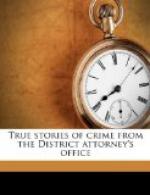“And now, M’sieu’,” said little Madame Reddon, raising her hands and clasping them entreatingly before her, “we have come to seek vengeance upon this miserable! This villain m’sieu! He has taken our money and made fools of us. Surely you will give us justice!”
“Yes,” echoed Lapierre stubbornly, “and the money was my own money, which I had made from the products of my farming.”
A month later Don Pedro Suarez de Moreno, Count de Tinoco, Marquis de la d’Essa, and Brigadier-General of the Royal Armies of the Philippines and of Spain, sat at the bar of the General Sessions, twirling his mustache and uttering loud snorts of contempt while Lapierre and Madame Reddon told their story to an almost incredulous yet sympathetic jury.
But the real trial began only when he arose to take the witness chair in his own behalf. Apparently racked with pain, and laboring under the most frightful physical infirmities, the General, through an interpreter, introduced himself to the jury by all his titles, asserting that he had inherited his patents of nobility from the “Prince of Arras,” from whom he was descended, and that he was in very truth “General-in-Chief of the Armies of the King of Spain, General Secretary of War, and Custodian of the Royal Seal.” He admitted telling the Lapierres that they were the heirs of five hundred million dollars, but he had himself honestly believed it. When he and the rest of them had discovered their common error they had turned upon him and were now hounding him out of revenge. The courtly General was as distingue as ever as he addressed the hard-headed jury of tradesmen before him. As what canaille he must have regarded them! What a position for the “Count de Tinoco”!
Then two officers entered the courtroom bearing the famous trunk of the General between them. The top tray proved to contain thousands of railroad tickets. The prosecutor requested the defendant to explain their possession.
“Ah!” exclaimed Moreno, twirling his mustaches, “when I was General under my King Don Carlos, in the Seven Years’ War of ’75 and also in Catalonia in ’80, I issued these tickets to wounded soldiers for their return home. At the boundaries the Spanish tickets were exchanged for French tickets.” He looked as if he really meant it.
Then the prosecutor called his attention to the fact that most of them bore the date of 1891 and were printed in French—not in Spanish. The prisoner seemed greatly surprised and muttered under his breath vaguely about “plots” and “conspiracies.” Then he suddenly remembered that the tickets were a “collection,” made by his little son.
Beneath the tickets were found sheaves of blank orders of nobility and blank commissions in the army of Spain, bearing what appeared to be the royal seal. These the General asserted that he had the right to confer, by proxy, for his “King Don Carlos.” Hundreds of other documents bearing various arms and crests lay interspersed among them. The prisoner drew himself up magnificently.




